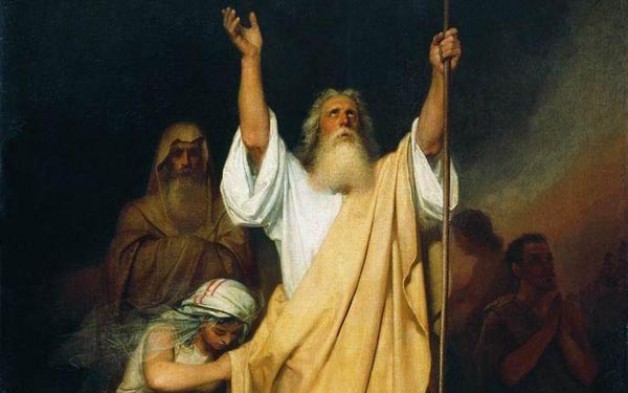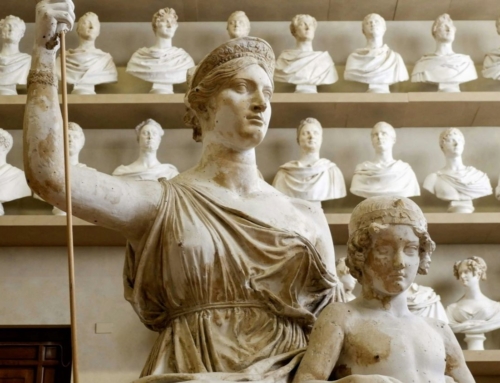On the feast day of a great saint with All Saints’ Day approaching, it seems to be a good time to reflect on the worth of seeking the intercession of the saints. I have often encountered people who find it odd that God would let the saints in heaven know things just so that they could turn right around and pray to God about them. While it certainly is mysterious, if we keep our eyes peeled while reading the Scriptures, we can see many places where God tells his saints on earth something that they wouldn’t otherwise know precisely so that they can pray to Him about it. Whether or not we understand the reason why, we can at least see that God’s providence works in this way. And if we reflect on this mystery with prayer, we can begin to see the wisdom and generosity which underlie the intercession of the saints.
We can first look to chapter 32 of the Book of Exodus. Moses had just ascended Sinai’s heights to receive the revelation of the Lord in that unforgettable theophany. He approached the blazing fire, then came the darkness, the trumpet blast, and the voice speaking words which caused those who heard them to beg that no further message be addressed to them. “Mount Sinai was completely enveloped in smoke, because the LORD had come down upon it in fire.” After forty days, with Moses still up on the mountain, the people of Israel feared they had been abandoned. At last they gave in to their temptation and fashioned a golden calf, paying divine honors to an image of metal.
High above the plain, deep in an encounter with God, Moses could not see or hear anything that was going on back in the camp. Suddenly, God interrupted the gift of the law to tell Moses of his people’s idolatry:
Go down at once because your people, whom you brought out of the land of Egypt, have acted corruptly. They have quickly turned aside from the way I commanded them, making for themselves a molten calf and bowing down to it, sacrificing to it and crying out, “These are your gods, Israel, who brought you up from the land of Egypt!” . . . Let me alone, then, that my anger may burn against them to consume them. Then I will make of you a great nation. (Ex 32:7-10)
But Moses, as the Psalm says, “Withstood him in the breach to turn back his destroying anger” (Ps 106).
If we believe, as the Scriptures tell us, that with God “there is no alteration or shadow caused by change,” then it must be that God all along intended to pardon his people after Moses interceded on their behalf. St. Jerome, commenting on this passage, points out how God left an opening for Moses in the way he phrased his proposal: “Let me alone . . . that . . .” seems to indicate that if Moses did not let him alone, he would not carry out his threat. To save them, God did not need Moses. But he wanted to make Moses an instrumental cause in their receiving forgiveness.
This example is hardly unique. In Genesis, God tells Abraham what he is planning for Sodom and Gomorrah, and Abraham prays to save his nephew Lot. In the books of the prophets, examples of intercession abound. The prophet Amos tells us that “Indeed, the Lord GOD does nothing without revealing his plan to his servants the prophets” (Am 3:7). God reveals his intention very clearly to the prophet Ezekiel, saying “Thus I have searched among them for someone who would build a wall or stand in the breach before me to keep me from destroying the land; but I found no one” (Ez 23:30). In other words, God wanted, and was actively looking for, someone to pray like Moses did.
Do we have to worry that God will look and find no one to intercede for his people? Now that Jesus has died and risen from the dead, the saints behold God face to face. They have arrived at “Mount Zion and the city of the living God, the heavenly Jerusalem, and countless angels in festal gathering.” Is he less intimate, less familiar with “the assembly of the firstborn enrolled in heaven” than with his saints on earth? Then we can be certain that God grants the Blessed to know what they need to know to intercede for us. Are “the spirits of the just made perfect” less loving, less selfless than Moses? Then we can be certain that they do intercede. Heeding the testimony of divine revelation, confident that God wants us to intercede for each other, let us pour out our prayers for ourselves and others. And let us call upon the saints in heaven, confident that God wants them to be our loving intercessors.
✠
Image: Ivan Kramskoy, Prayer of Moses after the Israelites go through the Red Sea







